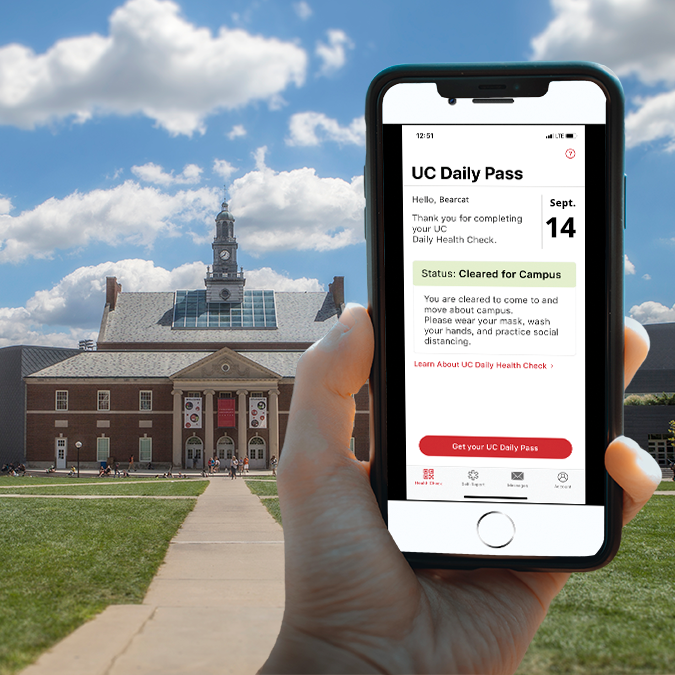
UC launches app to bolster COVID-19 safety and prevention efforts
The UC COVID Check app provides custom software, data modeling, contact tracing and more
The University of Cincinnati is using COVID Check — a state-of-the-art app to help safeguard the campus community and keep COVID-19 infection rates low. The app includes a daily health check and self-reporting features to identify symptomatic individuals and assist the university’s contact tracing efforts to limit transmission.
“We are committed to doing all we can to keep our campus community healthy and create a culture of care. UC COVID Check allows data regarding the number of cases, location of cases and more to be carefully reviewed by our health experts, allowing science to guide decision-making,” says Executive Director of University Health Services Kim Miller, MD, an internal medicine physician in the College of Medicine’s Department of Family and Community Medicine, who is leading the university’s health efforts and response related to COVID-19.
Secure data collected through daily health checks completed by UC faculty, staff and students, is pulled into a case management system. UC’s team can then conduct data modeling to identify and predict COVID hot spots and better understand the COVID dynamics on UC’s campuses to make informed decisions. UC has conducted contact tracing since classes resumed for the 2020-2021 academic year, but the app increases the speed of data collection as well as response time.
“Through data analyzation we can predict or identify infection probabilities,” says Michelle Renee Chyatte, DrPH, assistant professor in UC’s College of Allied Health Sciences. “When someone reports symptoms through the app’s daily health check or self-reports, our case managers are able to work with the individual to trace their movements, identify interactions with others and begin to develop a picture of potential infection points. This gives us a jump on prevention efforts.”
Here’s how the UC COVID Check App works:
- UC students, faculty and staff can sign in using UC’s secure Single-Sign-On log-in system.
- Once logged in, users answer a series of health-related questions, based on CDC guidelines, as part of a daily health check.
- Based on answers, users receive a “Green Pass” to come to or move about campus or a “Red Pass” to isolate. If a Red Pass is issued, a member of UC’s health care response team personally connects with the user within 24-28 hours to provide additional information and next steps.
- Information from the app is sent to the secure case management system to track cases and identify trends including potential hot spots.
"It is important for members of the UC Community to commit to completing a daily health check using the app,” says Miller. “If we work together to follow safety guidelines including social distancing, wearing masks and conducting daily health checks with the UC COVID Check app, our community can reduce risk to COVID-19. This is about creating a community of care. Everyone needs to do their part.”
Students, faculty and staff are required to wear masks and maintain six feet of separation on campus. UC has reconfigured spaces to meet social distancing guidelines, reduced density, and launched educational outreach efforts to reinforce safety and help reduce the spread of COVID-19.
The university recently opened a Respiratory Testing Center to test students on campus for COVID-19, flu, strep throat, and mono. A COVID Care Dashboard on the uc.edu/publichealth website is updated with reports of new and current COVID-19 cases.
Learn more about UC's health and safety efforts, including its Return to Campus Plan, by visiting uc.edu/publich health.
Tags
- Impact
- COVID-19
- Faculty Staff
- Provost
- Health
- Science & Tech
- College of Arts and Sciences
- Blue Ash College
- Clermont College
- College of Allied Health Sciences
- College of Design, Architecture, Art, and Planning
- College of Engineering and Applied Science
- College of Law
- College of Medicine
- College of Nursing
- College of Pharmacy
- College of Education, Criminal Justice, & Human Services
- College-Conservatory of Music
- Graduate School
- Lindner College of Business
Related Stories
Growing heart failure epidemic calls for prioritizing primary...
May 5, 2025
A rapidly growing heart failure epidemic calls for prioritizing primary prevention, according to a new scientific statement from the American Heart Association published in Circulation in April. The statement reviews the current evidence for predicting heart failure risk and offers risk-based strategies for heart failure prevention.
UC celebrates record spring class of 2025
May 2, 2025
UC recognized a record spring class of 2025 at commencement at Fifth Third Arena.
CCM welcomes new viola faculty member Brian Hong
May 1, 2025
UC College-Conservatory of Music Dean Pete Jutras has announced the appointment of Brian Hong as CCM's new Assistant Professor of Viola. His faculty appointment officially begins on Aug. 15, 2025. Hong has established a notable career as a critically acclaimed performer, inspiring pedagogue and successful music administrator. As the violist of the GRAMMY-nominated Aizuri Quartet from 2023-2025, he premiered major new works on nationally renowned chamber music series and conducted residencies at universities across the United States.

